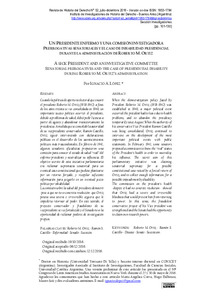Por favor, use este identificador para citar o enlazar este ítem:
https://repositorio.uca.edu.ar/handle/123456789/7774| Título: | Un presidente enfermo y una comisión investigadora : prerrogativas senatoriales y el caso de inhabilidad presidencial durante la administración de Roberto M. Ortiz | Autor: | López, Ignacio Alejandro | Palabras clave: | Ortiz, Roberto Marcelino, 1886-1942; Argentina. Presidente (1938-1940 : Ortiz); Castillo, Ramón S. (Ramón Santiago), 1873-1944; ENFERMEDAD; SENADO; INHABILITACION DE PERSONAS; PRESIDENCIA | Fecha de publicación: | 2016 | Editorial: | Instituto de Historia del Derecho | Cita: | López, I. A. Un presidente enfermo y una comisión investigadora : prerrogativas senatoriales y el caso de inhabilidad presidencial durante la administración de Roberto M. Ortiz [en línea]. Revista de Historia del Derecho. 2016, 52. Disponible en: https://repositorio.uca.edu.ar/handle/123456789/7774 | Resumen: | Resumen: Cuando la política de apertura electoral que encaró el presidente Roberto M. Ortiz (1938-1942) a fines de los años treinta se vio consolidada en 1940, un importante suceso político ocurrió: el presidente, debido a problemas de salud, debió pedir licencia a partir de agosto y abandonar transitoriamente la presidencia. A medida que se consolidó la autoridad de su vicepresidente conservador, Ramón Castillo, Ortiz siguió interviniendo con declaraciones públicas en el desarrollo de los acontecimientos políticos más trascendentales. En febrero de 1941, algunos senadores oficialistas propusieron una comisión para conocer el estado de salud “real” del enfermo presidente y neutralizar su influencia. El objetivo secreto de esta iniciativa parlamentaria era reclamar supremacía senatorial para un eventual caso constitucional que pudiese plantearse por un retorno forzado, y recopilar suficiente información para juzgarlo en un eventual juicio político por inhabilidad. La comisión sobre la salud del presidente demostró -pese a que no tuvo concreta resolución- que Ortiz poseía una severa e irreversible ceguera que le impediría retornar al poder. En este sentido, el proyecto conservador y fraudulento de su vicepresidente se vio fortalecido y el Senado tuvo la oportunidad de reclamar poderes de investigación propios Abstract: When the democratization policy faced by President Roberto M. Ortiz (1938-1942) was established in 1940, a major political event occurred: the president had to leave due to health problems, and to abandon the presidency temporarily since August. When the authority of his conservative Vice President Ramon Castillo was being consolidated, Ortiz continued to intervene on the development of the most important political events with public statements. In February 1941, some senators proposed a commission to know the “real” status of the President's health in order to neutralize his influence. The secret aim of this parliamentary initiative was claiming senatorial supremacy for a possible constitutional case raised by a forced return of Ortiz, and to collect enough information, for a possible impeachment by disability. The commission on the president's health -despite it had no concrete resolution- showed that Ortiz had a severe and irreversible blindness that would prevent him from returning to power. In this sense, the fraudulent conservative project of his Vice president was strengthened and the Senate had the opportunity to claim own research powers |
Cobertura Espacial: | ARGENTINA | URI: | https://repositorio.uca.edu.ar/handle/123456789/7774 | ISSN: | 1853-1784 | Disciplina: | CIENCIA POLITICA | Derechos: | Acceso Abierto | Fuente: | Revista de Historia del Derecho 52, 2016 |
| Aparece en las colecciones: | Artículos |
Ficheros en este ítem:
| Fichero | Descripción | Tamaño | Formato | |
|---|---|---|---|---|
| un-presidente-enfermo-comision-lopez.pdf | 324,59 kB | Adobe PDF |  Visualizar/Abrir |
Visualizaciones de página(s)
1.801
comprobado en 30-abr-2024
Descarga(s)
115
comprobado en 30-abr-2024
Google ScholarTM
Ver en Google Scholar
Este ítem está sujeto a una Licencia Creative Commons

